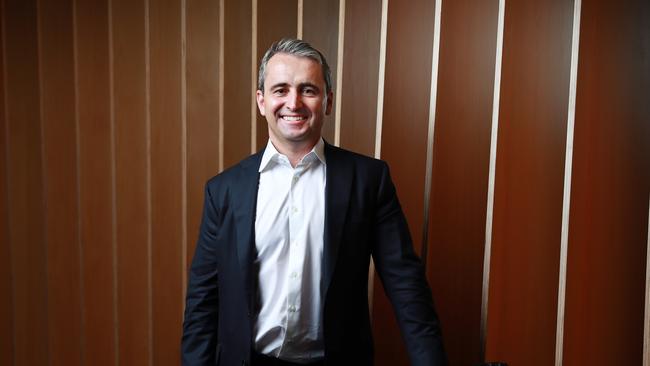Restricted stock units a nice little earner, come what may

The $1.6m in restricted stock units (RSUs) proposed by Commonwealth Bank for chief executive Matt Comyn — and by Origin Energy for CEO Frank Calabria, before they were withdrawn last Monday — are a wonderful invention if you’re on the right side of the ledger.
Unlike options, RSUs retain some value when they vest, even if the stock price declines over the deferred or restricted period.
Often, the only hurdle is continuing employment, typically for a three to five-year period.
For example, if a company grants an executive 100 RSUs and the stock price is $100 at the time they vest, the value of the grant is $10,000.
Even if the stock falls to $80, most of the value is preserved at $8000.
Proponents say deferred shares encourage executives to make decisions in the long-term interests of the business, and they’re less likely to be distracted by aggressive, long-term targets.
Boards, as well, no longer face the challenge of setting long-term targets in a volatile economic environment.
The problem with these arguments is that they ignore the justification for long-term incentives in the first place — that they vary according to performance.
If there’s a wholesale shift to RSUs, then let’s call it what it is — a huge spike in the fixed component of executive pay, at the same time as salaries for down-the-line employees have effectively been frozen.
The proposed equity grant for Comyn comes amid negotiations for an enterprise agreement with the Finance Sector Union, in which CBA reportedly offered staff earning less than $75,000 a 2 per cent pay increase for two years.
Those earning more than $75,000 would get a rise of 1.5 per cent, while staff on more than $110,000 would be subject to a pay freeze in the first year and an undetermined increase in 2021.
As revealed by this newspaper, proxy adviser ISS recommended a “no” vote against Comyn’s equity grant at the bank’s October 13 annual meeting, describing it as “regressive” and inconsistent with the treatment of staff in the EBA negotiations.
Comyn’s proposed pay in 2021 includes $2.3m in fixed remuneration, up to $2.16m in variable short-term pay, up to $1.6m in RSUs, and a similar amount in performance rights.
A maximum award of RSUs would represent 70 per cent of his fixed pay, and there are no traditional performance hurdles, just a vague promise for a “pre-grant assessment”.
What’s more, CBA provocatively said it would provide Comyn’s benefit in another form, including deferred cash payments, if the equity grant is voted down.
What’s the point of even having a vote if directors are prepared to overrule the outcome?
Origin wasn’t quite as bold with Calabria’s proposed $1.6m equity grant, with the board setting down five criteria for vesting.
However, ISS said they were subjective measures of “day job” duties, and at least some are also considered in relation to the short-term bonus. Part of Origin’s challenge is that the company’s long-term incentives have failed to vest in each of the last seven years due to its investment program and an ailing oil price.
An eighth strike might have been unpalatable for Calabria and the board, so they agreed that an amount equal to half the previous long-term incentive would be almost certain to vest.
Comyn’s package is about double that of Calabria.
Sure, CBA has outperformed its major-bank rivals, but Comyn is still fixing the sins of the past, and 2020 cash profit was down 11 per cent to $7.3bn.
CBA’s share price sagged 16 per cent over the course of the financial year from $82.78 to $69.42.
Comyn received no bonus in 2017 or 2018.
However, if CEO pay is to be seen as variable according to performance, the idea that a missed bonus has to be made up in succeeding years is wrong.
Word on the street
Some rather large numbers are starting to crop up in any discussion about Austrac’s investigation of possible anti-money laundering breaches by PayPal.
It’s no secret that the US payments giant is in the financial crime agency’s cross-hairs.
In September 2019, Austrac announced the appointment of an external auditor to examine PayPal’s compliance with its International Funds Transfer Instruction reporting obligations, which require regulated entities to report the transfer of funds or property to and from Australia.
Notoriously, Westpac tripped up 19.5 million times in relation to its IFTI obligations, accepting a record corporate penalty in this country of $1.3bn.
It’s previously been reported that PayPal’s possible transgressions could be in the hundreds of millions.
So far, there’s been precious little speculation about a likely penalty. However, if the word on the street bears any relationship to reality, Austrac’s asking price for a full settlement is very large, although it was bid down from a suggested $1.5bn in the Westpac case.
With PayPal, the external auditor’s report was received by Austrac at the end of August.
Chief executive Nicole Rose has been using it to determine the extent of any compliance issues, and if any further regulatory action is needed.
“Austrac continues to work with PayPal to assist them to strengthen their compliance capabilities,” the regulator told Four Pillars on Tuesday.
gluyasr@theaustralian.com.au Twitter: @Gluyasr



It was only a matter of time before Australia imported the latest trend in senior executive pay, including a solution for long-term bonus plans which persistently fail to vest in a bear market.